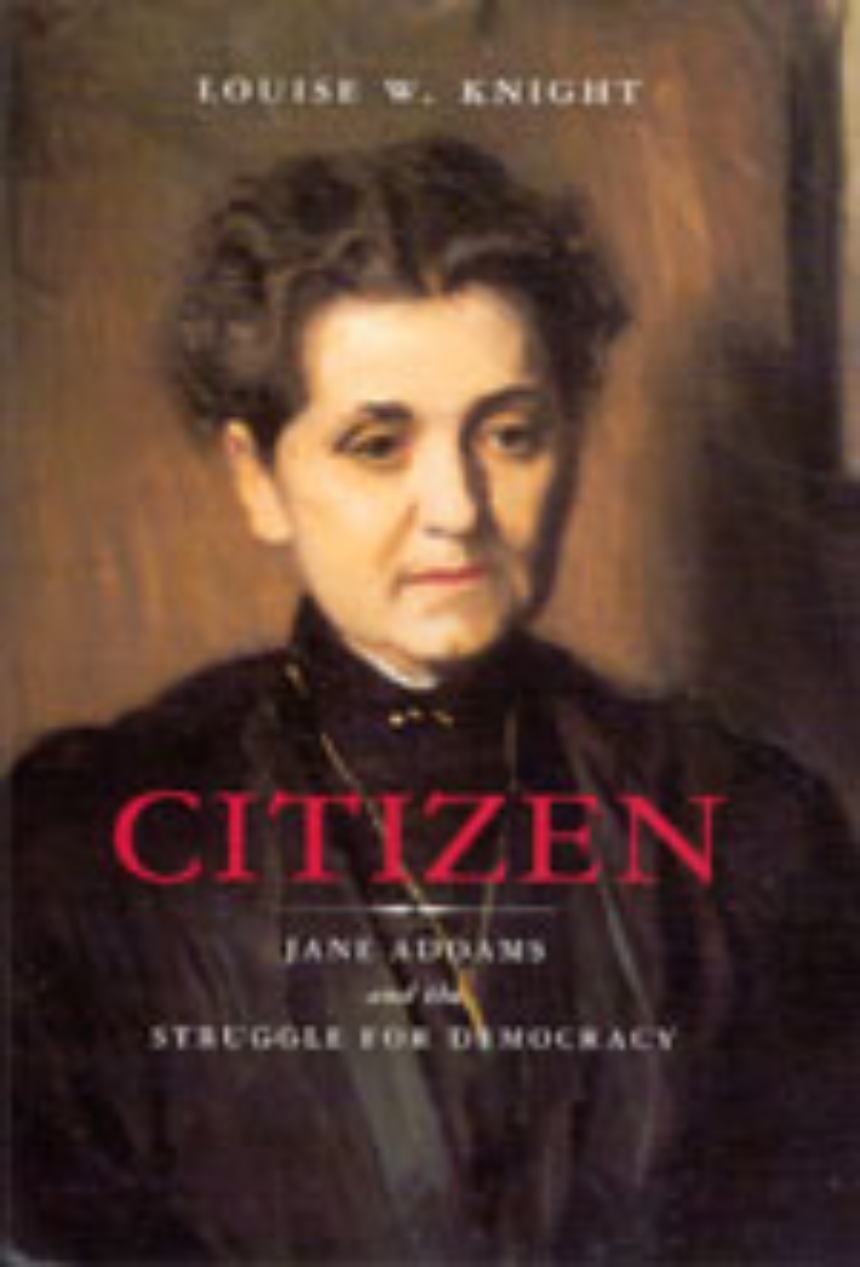Citizen
Jane Addams and the Struggle for Democracy
Jane Addams was the first American woman to receive the Nobel Peace Prize. Now Citizen, Louise W. Knight’s masterful biography, reveals Addams’s early development as a political activist and social philosopher. In this book we observe a powerful mind grappling with the radical ideas of her age, most notably the ever-changing meanings of democracy.
Citizen covers the first half of Addams’s life, from 1860 to 1899. Knight recounts how Addams, a child of a wealthy family in rural northern Illinois, longed for a life of larger purpose. She broadened her horizons through education, reading, and travel, and, after receiving an inheritance upon her father’s death, moved to Chicago in 1889 to co-found Hull House, the city’s first settlement house. Citizen shows vividly what the settlement house actually was—a neighborhood center for education and social gatherings—and describes how Addams learned of the abject working conditions in American factories, the unchecked power wielded by employers, the impact of corrupt local politics on city services, and the intolerable limits placed on women by their lack of voting rights. These experiences, Knight makes clear, transformed Addams. Always a believer in democracy as an abstraction, Addams came to understand that this national ideal was also a life philosophy and a mandate for civic activism by all.
As her story unfolds, Knight astutely captures the enigmatic Addams’s compassionate personality as well as her flawed human side. Written in a strong narrative voice, Citizen is an insightful portrait of the formative years of a great American leader.
“Knight’s decision to focus on Addams’s early years is a stroke of genius. We know a great deal about Jane Addams the public figure. We know relatively little about how she made the transition from the 19th century to the 20th. In Knight’s book, Jane Addams comes to life. . . . Citizen is written neither to make money nor to gain academic tenure; it is a gift, meant to enlighten and improve. Jane Addams would have understood.”—Alan Wolfe, New York Times Book Review
“My only complaint about the book is that there wasn’t more of it. . . . Knight honors Addams as an American original.”—Kathleen Dalton, Chicago Tribune
Citizen covers the first half of Addams’s life, from 1860 to 1899. Knight recounts how Addams, a child of a wealthy family in rural northern Illinois, longed for a life of larger purpose. She broadened her horizons through education, reading, and travel, and, after receiving an inheritance upon her father’s death, moved to Chicago in 1889 to co-found Hull House, the city’s first settlement house. Citizen shows vividly what the settlement house actually was—a neighborhood center for education and social gatherings—and describes how Addams learned of the abject working conditions in American factories, the unchecked power wielded by employers, the impact of corrupt local politics on city services, and the intolerable limits placed on women by their lack of voting rights. These experiences, Knight makes clear, transformed Addams. Always a believer in democracy as an abstraction, Addams came to understand that this national ideal was also a life philosophy and a mandate for civic activism by all.
As her story unfolds, Knight astutely captures the enigmatic Addams’s compassionate personality as well as her flawed human side. Written in a strong narrative voice, Citizen is an insightful portrait of the formative years of a great American leader.
“Knight’s decision to focus on Addams’s early years is a stroke of genius. We know a great deal about Jane Addams the public figure. We know relatively little about how she made the transition from the 19th century to the 20th. In Knight’s book, Jane Addams comes to life. . . . Citizen is written neither to make money nor to gain academic tenure; it is a gift, meant to enlighten and improve. Jane Addams would have understood.”—Alan Wolfe, New York Times Book Review
“My only complaint about the book is that there wasn’t more of it. . . . Knight honors Addams as an American original.”—Kathleen Dalton, Chicago Tribune
Reviews
Table of Contents
List of Illustrations
Acknowledgments
Introduction
Part I: The Given Life, 1860-88
One: Self-Reliance, 1822-60
Two: Three Mothers, 1860-73
Three: Dreams, 1873-77
Four: Ambition, 1877-81
Five: Failure, 1881-83
Six: Culture, 1883-86
Seven: Crisis, 1886-88
Part II: The Chosen Life, 1889-99
Eight: Chicago, 1889
Nine: Halsted Street, 1889-91
Ten: Fellowship, 1892
Eleven: Baptism, 1893
Twelve: Cooperation, 1893-94
Thirteen: Claims, 1894
Fourteen: Justice, 1895
Fifteen: Democracy, 1896-98
Sixteen: Ethics, 1898-99
Afterword: Scholarship and Jane Addams
List of Abbreviations
Notes
Bibliography
Index
Acknowledgments
Introduction
Part I: The Given Life, 1860-88
One: Self-Reliance, 1822-60
Two: Three Mothers, 1860-73
Three: Dreams, 1873-77
Four: Ambition, 1877-81
Five: Failure, 1881-83
Six: Culture, 1883-86
Seven: Crisis, 1886-88
Part II: The Chosen Life, 1889-99
Eight: Chicago, 1889
Nine: Halsted Street, 1889-91
Ten: Fellowship, 1892
Eleven: Baptism, 1893
Twelve: Cooperation, 1893-94
Thirteen: Claims, 1894
Fourteen: Justice, 1895
Fifteen: Democracy, 1896-98
Sixteen: Ethics, 1898-99
Afterword: Scholarship and Jane Addams
List of Abbreviations
Notes
Bibliography
Index
Awards
Illinois State Historical Society: Russell Strange Memorial Book Award
Won
